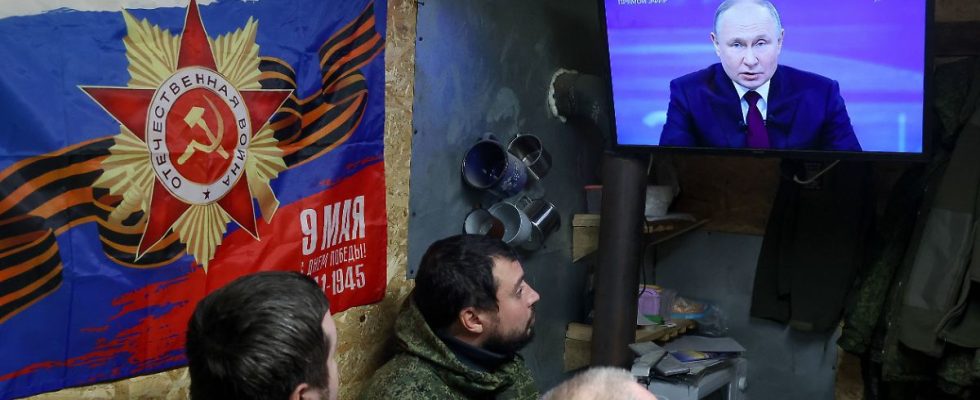Russia could produce enough weapons much faster than the West thinks to be able to attack NATO. They don’t have enough of an eye on what makes Russia tick, says security expert Fabian Hoffmann in an interview with ntv.de. At the University of Oslo, he researches, among other things, Russia’s military strategies.
“We now have about five to eight years in which we have to catch up,” says Defense Minister Boris Pistorius, referring to the threat from Russia and how Germany can arm itself against it. Now you come as a scientist and say: No, more like two to three years. So there is a lot of pressure. Why this time pressure?
In my opinion, what is missing from the debate is that Russian military strategy is also taken into account. If we look at it, it is not aimed at necessarily establishing a conventional balance with NATO. The Kremlin is much more concerned with gaining advantages through asymmetrical warfare.
So Russia itself doesn’t see the need to arm itself to the point where it could stand up to NATO in a long, intense war?
The Kremlin knows full well: its own troops lack the manpower and equipment to occupy large areas of NATO territory. NATO is simply fundamentally superior, even if you don’t take the military strength of the USA into account. So in a war we probably wouldn’t see Russia trying to fight NATO territorially from Tallinn to Lisbon. Instead, the Russians have been thinking for several decades about how to defeat NATO without achieving this balance of conventional forces.
With what result?
Warfare in cyberspace plays an important role, as does disinformation. If in the event of war Russia is not at all concerned with defeating NATO in combat, one strategy would be to build up psychological pressure on NATO states. Persuading decision-makers to enter into negotiations with Russia, which could lead to the disintegration of NATO as a political entity.
And how could Russia build this pressure?
A worst-case scenario that Russian intellectuals and officials are discussing, and which causes me great concern, would look like this: Relatively quickly after hostilities break out on NATO’s eastern flank, Russia manages to gain a certain amount of NATO territory conquer.
How large?
It wouldn’t have to be very big, not the entire Baltic region for example. An area just large enough so that NATO cannot ignore the occupation – just over two kilometers behind the border. But not a complete country, that’s not necessary. But what would then happen: Russia would very quickly expand its nuclear protective shield over this occupied territory. With the signal to NATO decision-makers: “If you try to retake this area, then we are also prepared to use nuclear weapons against your advancing troops.”
And that would lead to a heated debate within the NATO countries about how to respond to this threat.
On the one hand, in addition to the occupation in Eastern Europe, Russia could also attack Western Europe directly: with deep rocket and missile attacks against critical civilian infrastructure. In doing so, Russia is signaling what it could do and would be willing to do, namely inflicting incredible damage on the civilian population deep in the NATO hinterland.

Fabian Hoffmann researches military strategy, nuclear weapons, defense policy and international relations at the University of Oslo. He studied at King’s College London and in Groningen.
(Photo: aesthesia photography – Katsis)
Rocket attacks on power plants, sewage treatment plants, waterworks – would these be such scenarios?
Such attacks plus the fighting on the front line. This, combined with the nuclear shadow that would hang over a confrontation with Russia, could put enough psychological pressure on some politicians in Germany and other NATO countries to be willing to negotiate with Russia to find a solution outside of war. That would destroy NATO. We are talking about a worst-case scenario here, as I said, but I think it is plausible when I see what is discussed in Russian sources. This is exactly how they are preparing for war with NATO. Especially since 2014, this has been openly discussed among Russian military officials, in military magazines and other sources.
And would Russia be capable of such a strategy in two to three years?
Exactly. I certainly don’t want to predict that we will be at war with Russia in two to three years. That’s not what it is about. But I think we should be prepared for a worst-case scenario that is realistic and consistent with Russian strategy. I outlined that. If we look at this scenario, we now have two to three years to build a credible deterrent against Putin. This is our window of opportunity for rearmament so that Russia can reconsider stupid ideas of this kind.
You also explicitly mentioned Russia’s possible strategy of threatening NATO with nuclear weapons. In the Ukraine war, Western experts have so far judged such threats to be hardly credible. What would be different in a conflict with NATO?
In Russian military doctrine, one cannot really separate the conventional element of the armed forces from the nuclear elements. These are strongly interwoven and act together in the event of war. In a war between NATO and Russia, one would very quickly be confronted with Russian nuclear threats. Putin tried to do that in the Ukraine war, that’s true, but in a war against NATO he has even more at stake. This means that he would be prepared from the outset to resort to other means that are simply out of the question in Ukraine at the moment, simply because of the significantly greater conventional threat posed by NATO. In addition, India and China quickly made it clear that they would not tolerate the use of nuclear weapons in Ukraine.
Would that be different if Russia went to war against NATO?
In the war against NATO, China and India would probably no longer have much influence on Russia. Your position would then simply not matter. In the Ukraine war, Putin must also expect direct intervention from NATO or the USA if he were to use nuclear weapons. At least it is assumed that this is what was communicated to Putin. That wouldn’t be in his interest. Of course, such concerns do not play a role in a war with NATO. The cost-benefit factor that speaks for the use of nuclear weapons would most likely be completely different in a direct NATO-Russia war.
How do you think NATO needs to prepare and what can Germany do to be able to react to such a worst-case scenario?
First of all, we have to learn to talk about such scenarios again. We must become familiar with the fact that we are under nuclear threat and that nuclear deterrence accordingly plays a role in our security architecture. The next step is to debate what exactly our deterrence should look like. Because we are currently signaling to Russia that we are unprepared. That is the cognitive component. Then there is a physical component.
Something like the Bundeswehr division that will soon be stationed in Lithuania?
This physical component is our concrete deterrence capability against Russia, exactly. What do we need there? We must be able to specifically deter such worst-case scenarios as I have outlined. Because we see these scenarios in Russian sources and have to assume that Moscow is specifically considering them. For the scenario we have discussed here, it is crucial that we have an effective forward defense, such as the division in Lithuania. This means that NATO territory is defended directly on the border with Russia.
So that it doesn’t get to the point where territory occupied by Russia has to be reconquered afterwards?
From zero hour onwards, we are ready and able to defend NATO territory so that we do not end up in this predicament whereby Russia expands its nuclear protection area and can thereby exert psychological pressure. Additionally, we need more missiles and anti-aircraft defenses to defend ourselves against deep strikes into the hinterland. We also need a counter-strike capability – long-range weapons like the Taurus, for example. In this way we are sending a signal to Russia: If you shoot at us, we will shoot back.
From your perspective, what does this mean for the defense budget and our rough financial planning for the next few years?
That will be expensive. It’s going to be really expensive. That’s why it’s so important to have a larger debate about it across society. To make it clear that we will have to invest a lot in defense in the coming years because our arsenals are empty and our defensive capabilities are at their limits. I would say the two percent of GDP that NATO requires for defense would be the bare minimum for the next few years.
Germany will only achieve the two percent target this year by declaring even pension payments to former soldiers as defense expenditure. Do other EU states have higher demands?
Naturally. The Eastern European countries have understood it. They are already facing an existential threat from Russia – conventional and nuclear. That’s why Poland, for example, decided to spend four to five percent of its GDP on defense spending. The Balts may be small and not so economically strong, but they also invest a lot because they know exactly what is at stake. Estonia, for example, wants to invest up to three percent of its GDP in defense. Putin thinks politically differently than we do, he has never accepted the territorial integrity and sovereignty of the Eastern European states, and he cannot give credible security guarantees. German politicians should also understand this, it would help us all.
Frauke Niemeyer spoke to Fabian Hoffmann

